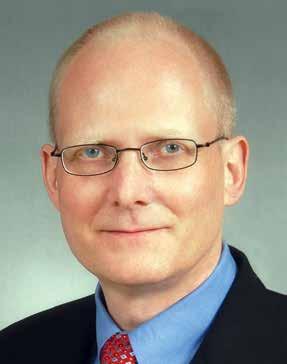
4 minute read
Breast Cancer Progress Report
2022 Research for a Cure
2022 Progress Report from WBCS Professor Hallgeir Rui, MD, PhD
I am excited to provide an update on breast cancer research at the Medical College of Wisconsin (MCW). Despite the two years of pandemic challenges, great progress continues to be made at the MCW Cancer Center. The Cancer Center is in great hands under new leadership. The new director, Dr. Gustavo Leone, has since 2020 brought impressive vision and energy to the Cancer Center’s efforts to gain NCI-designation. Supporting these efforts, Dr. Mary Horwitz has taken on the role of deputy director. Attesting to key progress under the new leadership, a very successful Cancer Center scientific retreat was held at the Discovery World in mid-May. Advanced research was highlighted, including studies of breast and prostate cancer, which are the focal areas of support by WBCS.
Among the most stimulating aspects of working at MCW are the outstanding colleagues, staff and trainees. Below I will briefly highlight some of the recent progress and efforts related to breast cancer research by MCW faculty members. Outstanding work spans the range from basic and translational studies of the molecular features of breast cancer, to clinical studies focused on improving diagnostic methods and exploring better treatments, to population science and investigations into how to improve the health of breast cancer survivors.
MCW is fortunate to have a strong team of researchers focusing on population science, community outreach, and disparities in breast cancer risk and survival. These investigators include Drs. Melinda Stolley, Joan Neuner, Kirsten Beyer, Tina Yen, Amanda Kong, Ellen Velie, Jamila Kwarteng, Sailaja Kamaraju, Ann Nattinger and others. Important progress is being made in understanding differences in risk factors for developing breast cancer, and understanding disparities in survival among patients who have been diagnosed with breast cancer. Key areas of investigation include socioeconomic factors, race/ethnicity, stress, nutrition, obesity, and exercise. An effort led by Drs. Nattinger and Beyer showed that breast cancer patients who lived in neighborhoods with restricted mortgage access had lower odds of surviving, even among women with health insurance.
Dr. Velie published the first report describing the Young Women’s Health History Study, which is a large case-control study of nearly 2000 women with the goal of identifying risk factors for breast cancer in young Black and White women. Dr. Velie and her team collected life-course exposures from in-person interviews, including information on socioeconomic, reproductive, and energy balance factors. My laboratory has the fortune to collaborate with Dr. Velie on analyses of molecular features of these tumors, which is important to consider since risk factors likely differ between breast cancer subtypes. In other work, the laboratories of Drs. Carol Williams, Amit Joshi, Ben Gantner, Guan Chen, Pradeep ChaluvallyRaghavan, Sunila Pradeep, and Ling Wang carry out exciting and innovative basic and translational work on specific molecular signaling pathways in breast tumors or develop and use novel imaging technologies to detect breast cancer.
My laboratory continues to work on methods to match patients more effectively with optimal treatments. An important collaborative effort published last fall, documented more accurate drug testing of patient breast cancer when grown in a new mouse strain that we developed with a hormone profile that better matches that of patients. This collaboration was supported in part by WBCS and involved many MCW faculty members, including Drs. Yunguang Sun, John Langenheim, Julie Jorns, Sharon Tsaih and Marja Nevalainen. More than half of breast cancer deaths are caused by therapy-resistant, estrogen receptor-positive disease. Research progress has been hampered by the lack of experimental breast cancer models for estrogen receptor-positive breast cancer that mimics human tumors and metastasize in mice. The hormone prolactin collaborates with estrogen and is a risk factor for development of estrogen receptor-positive breast cancer. Because we discovered that mouse prolactin fails to activate human receptors on patient breast tumors, we developed mice with human prolactin.
In these new mice, it is much easier to grow human breast tumors. We have generated a panel of untreated, estrogendependent tumors that also spontaneously metastasize. Extensive molecular profiling of patient tumors grown in these mice allowed us to identify several effective treatment strategies. Drug testing of patient-derived tumors in these mice is expected to help inform treatment selection for patients in the future. We also continue to apply new methods to measure patient tumor markers, including profiling of tumor-infiltrating immune cells, to help individualize treatment selection with immune-boosting drugs. We work closely with clinician scientists to employ these tumor biomarkers in novel breast cancer clinical trials at MCW/ Froedtert hospital, including Drs. Lubna Chaudhary, Sailaja Kamaraju, Yee Chung Chen, Adam Currey and Julie Jorns.
The generous funds raised by the dedicated WBCS members continue to support the thriving breast cancer and prostate cancer research programs at MCW. Investigators are spending the funds wisely for maximum research impact and progress, and the work leads to further research support from federal and foundation sources. Hope, optimism and excitement for breast cancer research continue to flourish. ~






